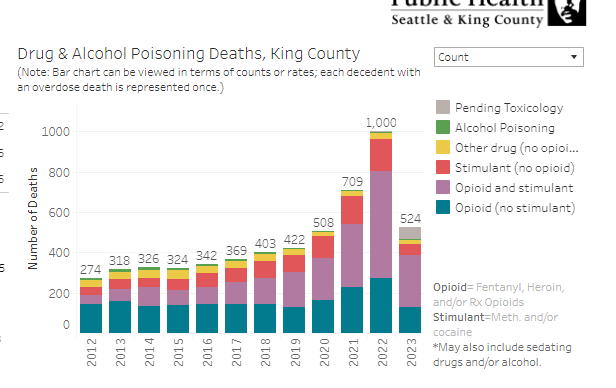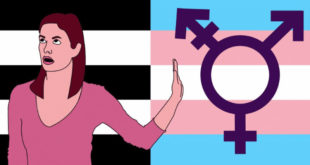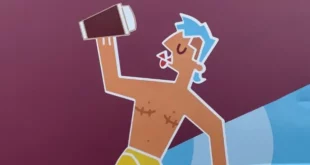As we all know too well, the road to utopia is littered with the corpses of junkies and untrained Ukrainian “soldiers.”
That’s just the way it is.
It’s our values in a democracy, because of the rules-based order. That’s who we are.
King County is on pace to exceed last year’s record-breaking total of 1,000 overdose deaths, and a majority of those overdose deaths involve fentanyl, according to the health department data.
KOMO News learned today Seattle-King County Public Health (SKCPH) has distributed over 13-thousand naloxone kits. Naloxone has become one of the go-to tools in the fight against the opioid crisis around the county and here in King County.
According to Peer Seattle, the group that operates two vending machines that dispense free naloxone for SKCPH– the machines appear to be such a low barrier that their staff has to restock weekly. They’ve been online since February, and people drop in daily until 9 p.m. to get the lifesaving medicine.
The vending machine also offers free fentanyl test strips. Users rely on a QR Code to gain access and can get up to two doses a month.
“It’s something everyone in this office is passionate about,” said Peer Seattle Director Christopher Archiopoli.
They are passionate about saving lives and making recovery possible for those battling drug addiction.
“This is happening everywhere, and it saves lives,” said Marc Schelffo with Peer Seattle. “I carry it with me now, it feels a little empowering, but it does also raise my awareness when I have a solution in my pocket that can save a life.”
Schelffo said he just recently started carrying Naloxone intranasal spray about a month ago after a teen overdosed just off I-5 recently. His partner witnessed it and said no one at the time had Narcan.
The vending machines offer free naloxone injectables and nasal spray.
“It is foolproof, and you are not going to misuse it…for the nasal spray…you just put it up the nose, press the button, and that’s it,” said Archiopoli.
Last year the Seattle Police Department (SPD) said its officer used naloxone 26 times on police calls. This year it jumped to 43 times, and we’re not even halfway through the year. SPD said it’s important to note the department also increased naloxone training this year.
Archiopoli said those struggling with substance use disorder have no demographic.
“We see the people unhoused who are using, but we don’t see or talk about the people dying in their homes.”
Peer Seattle said its drug users, advocates, and those with friends or family struggling with addiction tend to hit up their vending machines the most, but they’re not alone.
“The people that have surprised us are we’ve seen police officers and medical providers cause the barrier is so low on this,” said Archiopoli.
I go back and forth on the junkie question, but I think ultimately, you do have to acknowledge that there is potential validity to “the more dead junkies, the better.”
The counter-point is that society is effectively forcing men who would otherwise be perfectly normal into junkiedom by refusing to provide options for them to have meaningful work and build a family.
I recently reread Philip K. Dick’s “Galactic Pot Healer,” which was definitely not his crowning achievement as a novelist (for the record, I have traditionally agreed with the general consensus that this would be “Flow My Tears, The Policeman Said” and “Ubiq,” though in fan circles, I would always just say “The Simulacra,” and then add “‘Man in the High Castle’ is the worst, I love Hitler”). But “Galactic Pot Healer” deals with the issue of life without meaningful work, and how this literally crushes a man’s soul, which is a very important theme. This book was written in the 1960s (by a heavy drug user, by the way) when the narrative of popular culture was very much the opposite – that work is somehow an enslavement and denies men some kind of freedom.
I firmly believe that meaningful work is the first thing a man needs. Family is also of primary importance, but the family is only possible due to the work. You can’t have a family without work that is at least lucrative (and most lucrative work also happens to be meaningful).
If the choice is between “you can work at Walmart and pay student loans and also, it’s impossible to have a family in this society, and also, God doesn’t exist” and “you can be a junkie and get super juiced out before dying in the street somewhere,” I actually have some kind of respect for people who choose the latter.
The key point is that God does exist, so even if you have a struggle with work and family, you have to just bear that cross, as it is the thing that God has put on you.
That is what we all must remember: all of the struggles we have were put on us by God, and God doesn’t do things randomly. As Christians, we know that there is always a right and a wrong decision to make, regardless of the situation. That’s really all that is required of you: make the right decisions, and God will take care of the rest.
Snake Baker contributed to this article.
 Daily Stormer The Most Censored Publication in History
Daily Stormer The Most Censored Publication in History



